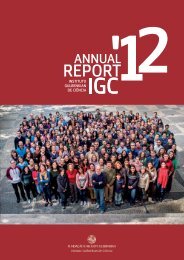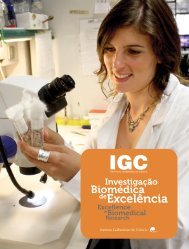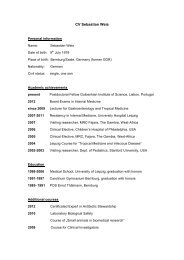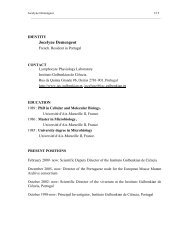organisation - the Instituto Gulbenkian de Ciência
organisation - the Instituto Gulbenkian de Ciência
organisation - the Instituto Gulbenkian de Ciência
- No tags were found...
You also want an ePaper? Increase the reach of your titles
YUMPU automatically turns print PDFs into web optimized ePapers that Google loves.
PHD PROGRAMME<br />
IN COMPUTATIONAL<br />
BIOLOGY<br />
Jorge Carneiro Head<br />
PhD in Biomedicine, Universida<strong>de</strong> do Porto, 1997<br />
PI of Quantitative Organism Biology Group<br />
The PhD Programme in Computational Biology (PDBC) is a pilot graduate programme<br />
that aims to create a critical mass of researchers in computational biology,<br />
to act as future lea<strong>de</strong>rs in <strong>the</strong> field. To this end it operates in close association with<br />
its twin initiative, <strong>the</strong> Collaboratorium in Computational Biology. It is sponsored<br />
by <strong>the</strong> Portuguese Ministry for Science and Technology, <strong>the</strong> Calouste <strong>Gulbenkian</strong><br />
Foundation, and Siemens Portugal SA.<br />
The PDBC was launched in 2005, has a <strong>de</strong>finitive lifespan and was planned to<br />
educate four generations of 12 stu<strong>de</strong>nts per year. Education is organised as a<br />
four-year programme divi<strong>de</strong>d into a year of full-time courses, workshops and<br />
projects, covering <strong>the</strong> main aspects of computational biology from <strong>the</strong> biological,<br />
computational, ma<strong>the</strong>matical, chemical and physical points of view, and<br />
three years of research training in a recognised laboratory anywhere in <strong>the</strong><br />
world, including Portugal. Non-national citizens were accepted but <strong>the</strong>ir research<br />
training was restricted to Portuguese research labs. The choice of laboratory<br />
was left to <strong>the</strong> stu<strong>de</strong>nt but met <strong>the</strong> standards set by <strong>the</strong> Programme<br />
Direction.<br />
SUPPORT STAFF<br />
Cláudio Soares (ITQB, Deputy Director)<br />
Manuela Cor<strong>de</strong>iro (Administrative Assistant)<br />
FUNDING<br />
Fundação para a Ciência e a Tecnologia (FCT), Portugal<br />
Siemens Portugal, SA<br />
Calouste Gulbenkain Foundation, Portugal<br />
PT Foundation, Portugal<br />
Fundação Luso-Americana para o Desenvolvimento (FLAD), Portugal<br />
Fundação para a Computação Científica Nacional (FCCN), Portugal<br />
The PDBC has come of age and all 41 stu<strong>de</strong>nts are carrying out <strong>the</strong>ir research<br />
training in labs in Europe and beyond, and eight (Inês <strong>de</strong> Jesus, José Cruz, Nuno<br />
Men<strong>de</strong>s, Marcio Mourão, Sara da Silva, Pedro Monteiro, Bruno Correia, and Luis<br />
Figueiredo) have obtained <strong>the</strong>ir doctoral <strong>de</strong>gree. Information on <strong>the</strong> individual<br />
stu<strong>de</strong>nts, and completed <strong>the</strong>ses, can be found on <strong>the</strong> programme’s website.<br />
IGC ANNUAL REPORT ‘11<br />
GRADUATE TRAINING AND EDUCATION<br />
126






